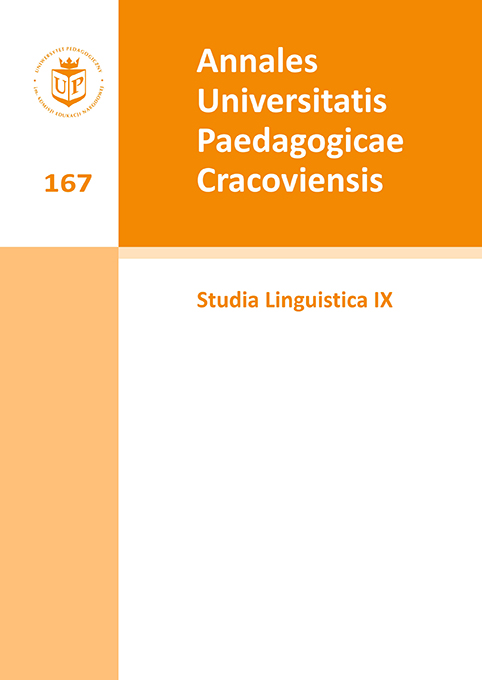Funkcje przymiotnika przygodny w nazwach odmian gatunkowych tekstów religijnych
Main Article Content
Abstract
The article is devoted to sub-genres of religious texts: sermons, prayers, and religious songs, which are called occasional sermon (kazanie przygodne), occasional prayer (modlitwa przygodna), and occasional religious song (pieśń przygodna), respectively. These sub-genres are intended for situations not included in the liturgical calendar, which occur in normal everyday life. By applying a proper religious text to these situations, they are supposed to gain a sacral dimension. The author analyzes the reasons for the decline in use of the adjective “przygodny” in favour of different terms, which complement the genre names “sermon” and “prayer”. She also tries to point out the reasons for the survival of the name “pieśń przygodna” up to the present day.
Downloads
Article Details
Author, submitting a text to the editorial board of the journal “Annales Universitatis Paedagogicae Cracoviensis. Studia Linguistica", certifies that the content of the article has not been published so far and that the work does not violate in any way the copyright or related rights of other person, as well as other rights of third parties, and that no one's rights to the work (or any part thereof) have been missed. After signing the contract, the property rights to the published materials are transferred to the University of the National Education Commission, Krakow.
“Annales Universitatis Paedagogicae Cracoviensis. Studia Linguistica” is an open access journal, and all its content is made available free of charge to users and institutions under the Creative Commons CC-BY-NC-ND 4.0 license (attribution, non-commercial use, no derivative works). Under this license, the authors agree that their work may be lawfully reused for any purpose, except for commercial purposes, without the prior consent of the author or publisher. Everyone can read, download, copy, print, distribute and process these works, provided that the author's marking and the original publication place are correct. Published texts may not be used to create derivative works (e.g. to translate and publish in another language without the consent of the publisher). This is in line with the BOAI (Budapest Open Access Initiative) definition. "Studia Linguistica" does not charge for submitting or processing articles.
References
Bednarczuk L., 1998, Transcendencja i transkomunikacja, „Prace Filologiczne”, t. 43, s. 71–81.
Google Scholar
Biłas-Pleszak E., Pleszak M., 2007, Pieśń kościelna – z rozważań nad ewolucją gatunku, [w:] Gatunki mowy i ich ewolucja, t. 3, red. D. Ostaszewska, Katowice, s. 253–263.
Google Scholar
Podsiad A., 2000, Słownik terminów i pojęć filozoficznych, Warszawa.
Google Scholar
Powszechna encyklopedia filozofii, 2007, t. 8 (Pap–Sc), Lublin.
Google Scholar
Wojtak M., 1999, Modlitwa ustalona – podstawowe wyznaczniki gatunku, [w:] W zwierciadle języka i kultury, red. J. Adamowski, S. Niebrzegowska, Lublin, s. 129–138.
Google Scholar
Wojtak M., 2006, Styl religijny we współczesnej polszczyźnie, „Stil” (Belgrad), t. 5, s. 139–146.
Google Scholar
Wojtak M., 2011, Współczesne modlitewniki w oczach językoznawcy. Studium genologiczne, Tarnów.
Google Scholar
Żmigrodzka B., 2000, Iaculatoria. O pewnym typie tekstów modlitewnych, [w:] Gatunki mowy i ich ewolucja, t. 1, red. D. Ostaszewska, Katowice, s. 276–290.
Google Scholar
Żmigrodzka B., 2003, Wariantywność wzorca tekstowego modlitwy do świętych, [w:] Śląskie studia lingwistyczne, red. K. Kleszczowa, J. Sobczykowa, Katowice, s. 238–247.
Google Scholar
pl.wikipedia.org/wiki/Armia_(zespół_muzyczny) (dostęp: 13.05.2014).
Google Scholar
pl.wikipedia.org/wiki/Triodante (album) (dostęp: 13.05.2014).
Google Scholar
